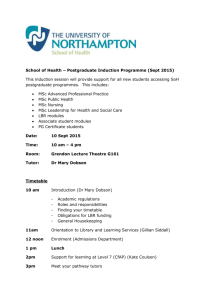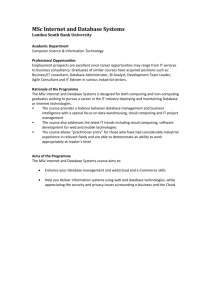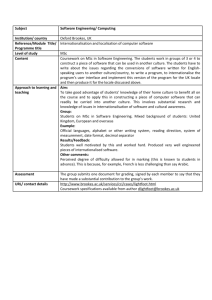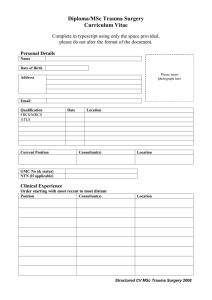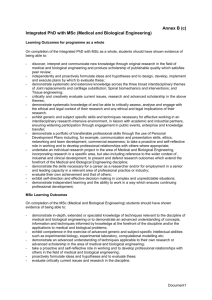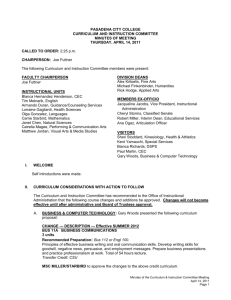First Canadian clinical trial studying ability of
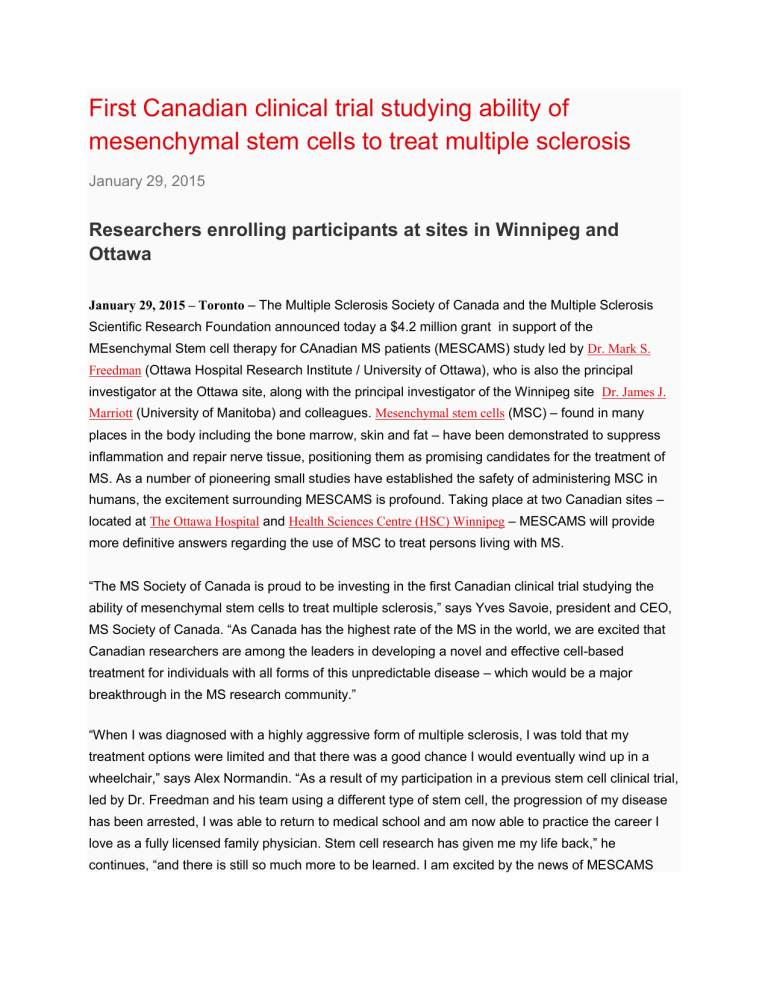
First Canadian clinical trial studying ability of mesenchymal stem cells to treat multiple sclerosis
January 29, 2015
Researchers enrolling participants at sites in Winnipeg and
Ottawa
January 29, 2015 – Toronto
– The Multiple Sclerosis Society of Canada and the Multiple Sclerosis
Scientific Research Foundation announced today a $4.2 million grant in support of the
MEsenchymal Stem cell therapy for CAnadian MS patients (MESCAMS) study led by Dr. Mark S.
Freedman (Ottawa Hospital Research Institute / University of Ottawa), who is also the principal investigator at the Ottawa site, along with the principal investigator of the Winnipeg site Dr. James J.
Marriott (University of Manitoba) and colleagues. Mesenchymal stem cells (MSC) – found in many places in the body including the bone marrow, skin and fat – have been demonstrated to suppress inflammation and repair nerve tissue, positioning them as promising candidates for the treatment of
MS. As a number of pioneering small studies have established the safety of administering MSC in humans, the excitement surrounding MESCAMS is profound. Taking place at two Canadian sites – located at The Ottawa Hospital and Health Sciences Centre (HSC) Winnipeg – MESCAMS will provide more definitive answers regarding the use of MSC to treat persons living with MS.
“The MS Society of Canada is proud to be investing in the first Canadian clinical trial studying the ability of mesenchymal stem cells to treat multiple sclerosis,” says Yves Savoie, president and CEO,
MS Society of Canada. “As Canada has the highest rate of the MS in the world, we are excited that
Canadian researchers are among the leaders in developing a novel and effective cell-based treatment for individuals with all forms of this unpredictable disease – which would be a major breakthrough in the MS research community.”
“When I was diagnosed with a highly aggressive form of multiple sclerosis, I was told that my treatment options were limited and that there was a good chance I would eventually wind up in a wheelchair,” says Alex Normandin. “As a result of my participation in a previous stem cell clinical trial, led by Dr. Freedman and his team using a different type of stem cell, the progression of my disease has been arrested, I was able to return to medical school and am now able to practice the career I love as a fully licensed family physician. Stem cell research has given me my life back,” he continues, “and there is still so much more to be learned. I am excited by the news of MESCAMS
and I look forward to seeing what other life changing therapies may result from future work in the area of stem cells.”
MESCAMS is part of a larger, international research effort studying MSC, led by Dr. Freedman and his Co-lead Principal Investigator Dr. A. Uccelli (Genoa, Italy). The international effort will allow for scientific resources to be pooled and offer expertise from nine countries worldwide undertaking parallel research. This effort will also assist in developing an international consensus on safe protocols for MSC treatment.
“Canada, with its two specialized stem cell clinical trial sites, is perched to make a huge contribution of twentyfive per cent of participants within the international collaboration,” says Dr. Mark S.
Freedman. “Together with our colleagues around the world, we will be able to arrive at answers more quickly in terms of the promise that mesenchymal cells hold in their ability for repair in MS – something that those living with this disease are most hopeful for.”
“We are excited to be able to offer this new clinical trial to Manitobans with MS,” says Dr. James J.
Marriott. “This is a promising area and we hope this study will demonstrate the safety and feasibility of this therapy, and ultimately lead to further research and new treatments.”
MESCAMS will put to test the remarkable potential of MSC for reducing harmful inflammation and promoting healing of injured tissue as well as fully determine their safety profile in individuals with
MS. A total of 40 study participants (20 per site) will receive intravenous treatment of their own bone marrow extracted MSC at either the start of the study or at 24 weeks. Those who do not receive MSC will instead receive a mock solution; this is done to determine if the effects of the stem cells are real or attributed to a placebo effect. Unlike previous studies involving transplantation of hematopoietic stem cells to re-boot the immune system, there is no requirement for chemotherapy in MESCAMS.
As well, there is no concern regarding rejection of the cells as they are harvested from the individuals receiving the treatment (i.e. they are autologous stem cells). The trial is expected to begin in early
2015. For further details regarding study eligibility and enrollment, the public may visit clinicaltrials.gov/show/NCT02239393.
The grant announced by the MS Society of Canada and the Multiple Sclerosis Scientific Research
Foundation for MESCAMS is also supported by proud funders Research Manitoba ($1.5 million) and A&W Food Services of Canada Inc.
($1 million).
“Research Manitoba welcomes the opportunity to support the search for new treatment options and advance research in the area of multiple sclerosis” says Dr. Brian Postl, Chair, Research Manitoba.
“We are proud of the dedicated researchers and participants and are pleased to support this partnership within the MS research community.”
“Over the past five years our guests and our franchised operators have been incredibly supportive of our annual Cruisin' to End MS fundraising campaign,” says Paul Hollands, president and CEO, A&W
Food Services of Canada Inc. “We are delighted to see resources raised through this campaign supporting world leading research which offers real hope to people living with MS."
MS Scientific Research Foundation-funded trial poised to explore promising new mesenchymal stem cell therapy in people with MS
January 28, 2015
Background
Mesenchymal stem cells (MSC) have recently garnered the attention of multiple sclerosis (MS) researchers for their remarkable ability to reduce harmful inflammation and promote healing of injured tissue. However, it is not currently known whether MSC can benefit people affected by MS, an autoimmune disease that targets the central nervous system. To date, animal studies in the laboratory and preliminary clinical trials in humans have shown promise that MSC are both safe and potentially effective in reducing inflammation and promoting repair, paving the road for larger, more comprehensive studies to investigate the therapeutic benefits of MSC treatment in people with MS.
The discovered potential of MSC in treating MS has culminated in the launch of MESCAMS
( ME senchymal S tem cell therapy for CA nadian MS patients), a phase II clinical trial that is funded in part by the MS Scientific Research Foundation, Research Manitoba, and A&W Food Services of
Canada Inc. Spearheaded by Dr. Mark Freedman (Ottawa Hospital Research Institute, University of
Ottawa), principal investigator (PI) at the Ottawa site and Dr. James Marriott (University of Manitoba),
PI at the Manitoba site, MESCAMS is part of an international mesenchymal stem cell research effort encompassing nine countries.
The aim of this study is to determine if treatment with autologous (originating from the same person receiving treatment) MSC in people with MS is safe, can reduce harmful inflammation in the brain, and possibly contribute to repair of the central nervous system.
The Study
The MESCAMS study is a randomized , double-blind , cross-over study involving 40 patients across two sites: The Ottawa Hospital and Health Sciences Centre (HSC) Winnipeg. The trial will include
participants affected by relapsing-remitting MS in whom existing therapies have not worked optimally, as well as select individuals with secondary and primary progressive forms of MS
(see ClinicalTrails.gov
for detailed inclusion and exclusion criteria). Participants will be randomly assigned to one of two treatment groups, but all participants will be injected intravenously (IV) with
MSC collected from their own bone marrow at some point in the study, depending on their group:
Early treatment group: participants are given a single infusion of autologous MSC at week 0, then cross over at week 24 to receive a placebo infusion.
Late treatment group: participants are given a single placebo infusion at week 0, then cross over at week
24 to receive an infusion of autologous MSC.
All participants will be followed for 48 weeks. Over the course of the study, the participants will be assessed to determine the safety of autologous MSC by checking for side effects and documenting these adverse health events. In addition, the researchers will examine any potential clinical benefits of MSC therapy, including reduction of inflammatory injury in the brain as measured by magnetic resonance imaging (MRI), number of relapses, disability progression, and several potential indicators of repair in the central nervous system.
Comment
The MESCAMS study is the first Canadian clinical trial evaluating the safety and efficacy of MSC as a treatment for multiple sclerosis. This marks an important step forward in MS research and treatment, as early experiments with stem cell therapies have shown encouraging results. One major factor which distinguishes this study from the previously conducted Canadian bone marrow transplantation (BMT) trial is that participants are not subjected to intensive chemotherapy, which is required prior to BMT to effectively eliminate the diseased immune system.
MSC therapy, on the other hand, works by subduing the harmful immune cells that drive MS, and so the researchers anticipate that the procedure will carry a lower risk to participants, since no chemotherapy is required and the MSC have the potential of controlling inflammation in the absence of other MS medications. As well, the study design uses autologous MSC, in which each participant receives their own stem cells, thus diminishing the risk of the participant’s immune system rejecting the cells.
The results of the MESCAMS trial will be pooled with data emerging from the concurrent international
MSC trial, culminating in a rich body of information that could not otherwise be attained by individual research centres alone. The Canadian contribution to the trial is poised to make Canada a leader in researching MSC therapy in MS, largely owing to the seasoned expertise of the lead investigators and other collaborators, as well as substantial investment into state-of-the-art stem cell facilities built in compliance with stringent government regulations. Ultimately, the hope is that the findings from the
MESCAMS study will build on results seen in pioneering MSC studies and help lead to treatment options for people with MS.
Safety and Efficacy of Intravenous Autologous Mesenchymal Stem Cells for MS: a Phase 2 Proof of Concept Study (MESCAMS)
This study is not yet open for participant recruitment. (see Contacts and Locations )
Verified November 2014 by Ottawa Hospital Research Institute
Sponsor:
Ottawa Hospital Research Institute
Information provided by (Responsible Party):
Ottawa Hospital Research Institute
ClinicalTrials.gov Identifier:
NCT02239393
First received: September 10, 2014
Last updated: November 28, 2014
Last verified: November 2014
Purpose
The mechanism of action of MSC relies on their ability to modulate pathogenic immune responses and provide neuroprotection through the release of anti-apoptotic, anti-oxidant and trophic factors as demonstrated by in-vitro and in-vivo preclinical studies.
The primary outcome of this study is to evaluate:
Treatment's safety within one year from MSC administration by measuring the number, time-frame and severity of adverse events and
Treatment's activity in terms of reduction in total number of gadolinium-enhancing lesions (GEL) by magnetic resonance imaging (MRI) scans.
Secondary outcomes are to gain preliminary information on the efficacy of the experimental treatment in terms of combined MRI activity and clinical efficacy (incidence of relapses and disability progression).
Patients will be randomized to receive immediate vs. delayed treatment with either a dose equal to 1-
2 millions/kg of body weight of autologous MSC, or equivalent volume of suspension media at baseline. At week 24 treatments will be reversed.
Condition Intervention Phase
Multiple Sclerosis
Study Type: Interventional
Biological: Mesenchymal Stem Cells Phase 2
Study Design: Allocation: Randomized
Endpoint Classification: Safety/Efficacy Study
Intervention Model: Crossover Assignment
Masking: Double Blind (Subject, Caregiver, Investigator, Outcomes Assessor)
Primary Purpose: Treatment
Official Title: MEsenchymal Stem Cell Therapy for CAnadian MS Patients
Resource links provided by NLM:
Genetics Home Reference related topics: multiple sclerosis
MedlinePlus related topics: Multiple Sclerosis
U.S. FDA Resources
Further study details as provided by Ottawa Hospital Research Institute:
Primary Outcome Measures:
Safety [ Time Frame: 24 weeks from first infusion ] [ Designated as safety issue: Yes ]
Incidence and severity of adverse events in MSC treatment group compared to placebo group
Efficacy [ Time Frame: 24 weeks from first infusion ] [ Designated as safety issue: No ]
Total number of gadolinium-enhancing lesions (GEL) on MRI scan
Secondary Outcome Measures:
Efficacy [ Time Frame: 48 weeks from first infuaion ] [ Designated as safety issue: No ]
Number of gadolinium-enhancing lesions (GEL) counted over week 28, 36, 48 compared with the number of GEL counted over 4, 12, 24 weeks.
Efficacy [ Time Frame: 24 weeks from first infusion ] [ Designated as safety issue: No ]
Combined unique magnetic resonance imaging (MRI) activity (number of new or enlarging T2, or enhancing or re-enhancing lesions), volume of gadolinium-enhancing lesions (GEL) and volume of black holes (BH) over 4, 12, 24 weeks compared between treatment groups.
Efficacy [ Time Frame: 48 weeks from first infusion ] [ Designated as safety issue: No ]
Combined unique magnetic resonance imaging (MRI) activity, volume of gadolinium-enhancing lesions (GEL) and volume of black holes (BH) over week 28, 36, 48 compared with the same outcomes over 4, 12 and 24 weeks.
Efficacy [ Time Frame: 48 weeks from first infusion ] [ Designated as safety issue: No ]
Number of relapses in MSC treatment group vs. placebo group in the first 24 weeks and after crossover re-treatment in the two groups.
Efficacy [ Time Frame: 48 weeks from first infusion ] [ Designated as safety issue: No ]
Time to sustained progression of disability and proportion of progression-free patients compared between treatment groups during the first 24 weeks and after cross-over.
Estimated Enrollment: 40
Study Start Date: December 2014
Estimated Study Completion Date: September 2017
Estimated Primary Completion Date: September 2016 (Final data collection date for primary outcome measure)
Arms Assigned Interventions
Experimental: Autologous Mesenchymal Stem
Cells
At week 0 a single infusion of either ex-vivo expanded autologous MSC or suspension media will be administered intravenously at a dose of 1
Biological: Mesenchymal Stem Cells
Mesenchymal Stem Cells in Plasma-Lyte A
(Baxter) suspension media, containing 5%
Human Albumin and 10% dimethylsulfoxide
(DMSO, total volume of 5mL DMSO in final cell
to 2 x 1000000 MSC/Kg body weight. At week
24, another infusion will be performed for crossover re-treatment: at week 24 treatments will be reversed compared to week 0. product) and autologous MSCs at a dose of 1 to
2 x 106 MSC/Kg participant's body weight at randomization.
Matching placebo Plasma-Lyte A (Baxter) suspension media, containing 5% Human
Albumin and 10% DMSO (total volume of 5mL
DMSO in final cell product).
Placebo Comparator: Suspension media
At week 0 a single infusion of either ex-vivo expanded autologous MSC or suspension media will be administered intravenously at a dose of 1 to 2 x 1000000 MSC/Kg body weight. At week
24, another infusion will be performed for crossover re-treatment: at week 24 treatments will be reversed compared to week 0.
Detailed Description:
The mechanism of action of Mesenchymal Stem Cells (MSCs) relies on their ability to modulate pathogenic immune responses and provide neuroprotection through the release of anti-apoptotic, anti-oxidant and trophic factors as demonstrated by in vitro and in vivo preclinical studies.
Patients will be randomized to receive immediate vs. delayed treatment with either a dose equal to 1-
2 millions/kg of body weight of autologous MSC, or equivalent volume of suspension media at baseline. At 6 months treatments will be reversed.
The primary outcome of this study is to evaluate
treatment's safety within one year from MSC administration by measuring the the number, time-frame and severity of adverse event and
treatment's activity in terms of reduction in the total number of contrast-gadolinium enhancing lesions
(GEL) by magnetic resonance imaging (MRI) scans.
Secondary outcomes are to gain preliminary information on the efficacy of the experimental treatment in terms of combined MRI activity and clinical efficacy (incidence of relapses and disability progression).
Eligibility
Ages Eligible for Study: 18 Years to 50 Years
Genders Eligible for Study: Both
Accepts Healthy Volunteers: No
Criteria
Inclusion Criteria:
1) Males and females with a diagnosis of MS a. Relapsing remitting MS (RRMS) not responding to at least 1 year of attempted therapy with one or more of the approved therapies (beta-interferon, glatiramer acetate, natalizumab, mitoxantrone, fingolimod, dimethyl fumarate, teriflunomide, alemtuzumab) as evidenced by at least one of the following:
i) ≥1 clinically documented relapse in past 12 months ii) ≥2 clinically documented relapses in past 24 months iii) ≥1 gadolinium-enhancing lesion (GEL) at MRI performed within the past 12 months b. Secondary progressive MS (SPMS) with both:
i) an increase of ≥1 EDSS point (if at randomization EDSS ≤ 5.0) or 0.5 EDSS point (if at randomization EDSS ≥ 5.5) in the past 12 months ii) ≥1 clinically documented relapse or ≥ 1 gadolinium-enhancing lesion (GEL) at MRI within the past 12 months c. Primary progressive MS (PPMS) patients with all the following features:
i) an increase of ≥1 EDSS point (if at randomization EDSS ≤ 5.0) or 0.5 EDSS point (if at randomization EDSS ≥5.5), in the past 12 months ii) ≥ 1 gadolinium-enhancing lesion (GEL) at MRI performed within the past 12 months
iii) positive cerebrospinal fluid (CSF) (oligoclonal banding)
2) Age 18 to 50 years old, inclusive at time of informed consent
3) Disease duration 2 to 10 years (inclusive)
4) EDSS 3.0 to 6.5
5) Able and willing to sign informed consent prior to any study-related activities
Exclusion Criteria:
1) RRMS not fulfilling inclusion criteria
2) SPMS not fulfilling inclusion criteria
3) PPMS not fulfilling inclusion criteria
4) A history of active or chronic infection including infection with HIV1-2, chronic Hepatitis B or
Hepatitis C
5) Treatment with any immunosuppressive therapy, including natalizumab and fingolimod, within the
3 months prior to randomization
6) Previous treatment with cladribine or alemtuzumab
7) Treatment with interferon-beta, glatiramer acetate, teriflunomide or dimethyl fumarate within the 30 days prior to randomization (all teriflunomide patients will be required to have followed a wash-out with either cholestyramine or activated charcoal as indicated in the product monograph)
8) Treatment with corticosteroids within the 30 days prior to randomization
9) Relapse occurred during the 60 days prior to randomization
10) Previous history of a malignancy (patient reported) other than basal cell carcinoma of the skin or carcinoma in situ that has been in remission for more than one year
11) Severely limited life expectancy by any other co-morbid illness
12) History of previous diagnosis of myelodysplasia or previous hematologic disease (patient reported) or current clinically relevant abnormalities of white blood cell counts
13) Pregnancy or risk of pregnancy (this includes participants that are not willing to practice active contraception for the duration of the study)
14) eGFR < 60 mL/min/1.73m2 or known renal failure or inability to undergo MRI examination
15) Known allergy to gentamicin or related aminoglycosides
16) Inability to give written informed consent in accordance with research ethics board guidelines
17) Concomitant participation in another clinical trial
18) Inability to adhere to protocol according to the investigator's medical judgement
Contacts and Locations
Choosing to participate in a study is an important personal decision. Talk with your doctor and family members or friends about deciding to join a study. To learn more about this study, you or your doctor may contact the study research staff using the Contacts provided below. For general information, see Learn About Clinical Studies.
Please refer to this study by its ClinicalTrials.gov identifier: NCT02239393
Contacts
Contact: Catherine Hilliker, RN 613-737-8104 ext 7 MESCAMS@ohri.ca
Locations
Canada, Manitoba
Health Sciences Centre
Not yet recruiting
Winnipeg, Manitoba, Canada, R3A 1R9
Contact: James J. Marriott, MD MSc FRCPC 204-787-
4951 jmarriott@exchange.hsc.mb.ca
Contact: Barbara Stanger, RN 204-787-2905 bstanger@hsc.mb.ca
Principal Investigator: James J. Marriott, MD MSc FRCPC
Canada, Ontario
Ottawa Hospital - General Campus
Ottawa, Ontario, Canada, K1H 8L6
Not yet recruiting
Contact: Catherine Hilliker, RN 613-737-8104 ext 7 MESCAMS@ohri.ca
Principal Investigator: Mark S. Freedman, MD MSc FRCPC
Sponsors and Collaborators
Ottawa Hospital Research Institute
Investigators
Principal Mark S. Freedman, MSc MD
Investigator: FRCPC
More Information
No publications provided
Ottawa Hospital Research
Institute
Responsible Party: Ottawa Hospital Research Institute
ClinicalTrials.gov Identifier: NCT02239393 History of Changes
Other Study ID Numbers: 20140368
Study First Received: September 10, 2014
Last Updated: November 28, 2014
Health Authority: Canada: Health Canada
Canada: Ethics Review Committee
Keywords provided by Ottawa Hospital Research Institute:
Multiple Sclerosis
Mesenchymal Stem Cells
MSC
Additional relevant MeSH terms:
Multiple Sclerosis Demyelinating Diseases
Sclerosis Immune System Diseases
Autoimmune Diseases
Autoimmune Diseases of the Nervous System
Demyelinating Autoimmune Diseases, CNS
Nervous System Diseases
Pathologic Processes
ClinicalTrials.gov processed this record on January 29, 2015

